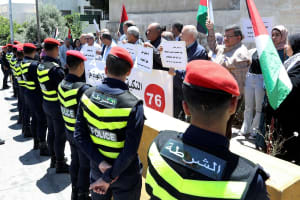Israeli minister calls for action to end infiltration, security threats on Jordanian border

Israeli minister, Yitzhak Wasserlauf, who heads the Negev, Galilee, and National Resilience Ministry, officially requested an emergency Cabinet meeting to address the growing mass infiltration from Jordan, as well as the looming security threat on Israel’s eastern border.
The Kingdom of Jordan signed a peace agreement with Israel in 1994 and the border between the two nations has been relatively peaceful ever since. However, Wasserlauf cited a recent investigative report by the Maariv news outlet that revealed that more than 4,000 individuals had illegally crossed the largely unguarded border from Jordan to Israel in recent months.
“This is not just a demographic problem, but a real threat to the integrity of the State of Israel," Wasserlauf warned. "The unsecured border serves as a conduit for smuggling weapons, drugs, and dangerous materials, allowing our enemies to penetrate our territory.”
Wasserlauf described the situation on the Jordanian border as an eastern Philadelphi Corridor on steroids,” a reference to a narrow strip of land along the border between Gaza and Egypt where Hamas and Palestinian Islamic Jihad (PIJ) terrorists have used for years to smuggle weapons and other materials into the coastal enclave.
While the Israeli military currently controls the Philadelphi Route, Hamas has demanded that IDF troops vacate the area while negotiations for a Gaza ceasefire/hostage deal take place.
Wasserlauf emphasized that the current situation on the border with Jordan is untenable and undermines Israel’s long-term security.
“We cannot continue to ignore the growing danger. We must act decisively to seal the border and protect the state’s security,” the minister warned.
While Jordan seeks peace and stability, the kingdom is vulnerable to domestic and international terrorism. Jordanian and Israeli officials fear that the Iranian regime is trying to undermine Jordan with an inflow of Iranian-backed terrorists.
“Iran’s next strategic goal is to incite an uprising in the West Bank and put pressure on Israel’s eastern border, and has been active in Jordan for some time,” a senior Israeli official assessed. “This activity has been known to us even before October 7, but in the last ten months, we have seen a significant escalation of this concerning trend.”
The sparsely populated Arava Desert region along the Jordanian-Israeli border is considered particularly vulnerable to infiltration due to limited border security. Some local Israeli residents along the Jordanian border fear a potential Oct. 7-type attack.
In April, Dror Shmueli, the security head of the local Hevel Eilot Regional Council, criticized Israel’s insufficient security along the long Jordanian border in Israel's southernmost region.
"The border is abandoned, the IDF neglects the local alert squads and isn’t giving enough equipment. The government realized this on October 7. If a terrorist cell arrives without warning, it will take forever for the military to arrive,” Shmueli warned at the time.

The All Israel News Staff is a team of journalists in Israel.
You might also like to read this:















